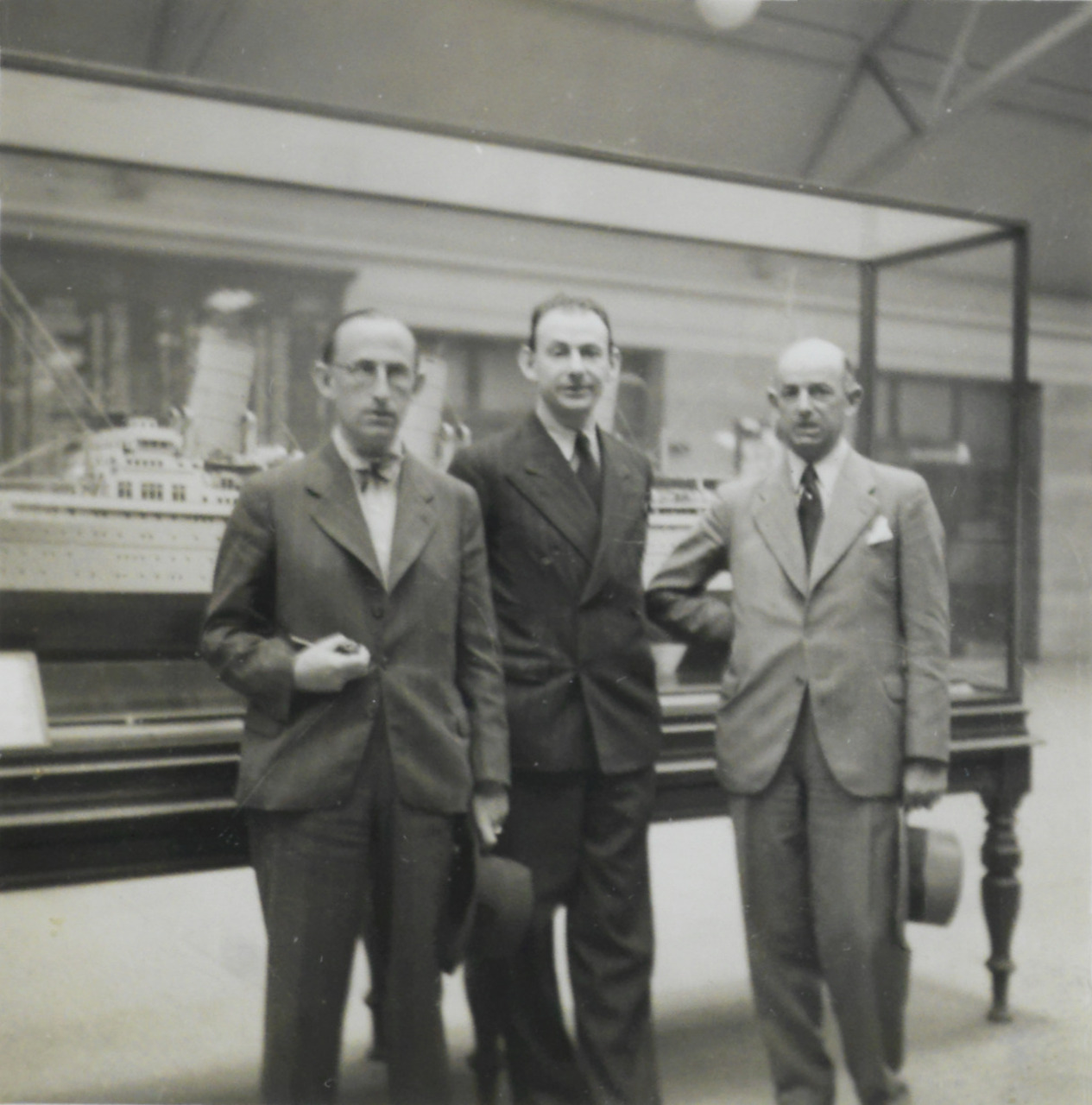Born on August 8, 1891 in Berlin,
Germany
Died on November 19, 1985 in Sydney, Australia
Occupation: Print shop owner, businessman
Migration: Australia,
1938
“But then Hitler came in 1933, and in 1938 we were in Australia and started a new life with a lot of work.” Reinhold Scholem in a letter to his brother Gershom Scholem, 29 February 1972, National Library of Israel, Archives Department, Arc. 4*1599, series 01, file 3031.
In 1972, the German-Jewish businessman Reinhold Scholem wrote those words in a letter to his brother Gershom Scholem (1897–1982), who was living in Jerusalem. Reinhold Scholem spent the first 47 years of his life in Germany and the last 47 years in Australia, where he had to start from scratch economically and socially.

Fig. 1: Erich, Gershom and Reinhold Scholem in Montreal, 1938 (from left to right). Erich and Reinhold Scholem were on their way to Australia via Canada. Gershom Scholem was spending time in the United States as a visitor scholar; Gershom Scholem Archive, National Library of Israel.
As the eldest son of middle-class print shop owner Arthur Scholem (1863–1925) and his wife Betty Scholem née Hirsch (1866–1946), Reinhold Scholem grew up in central Berlin. He enrolled at the Luisenstädtisches Realgymnasium in the fall of 1897, but left before completing his secondary school completion examination (“Abitur”) to take a series of apprenticeships as a printer in London, Paris, and Turin. He fulfilled his one-year military service with Telegraph Battalion no. 1 of the Prussian army from October 1912 to October 1913 and served again with the signal troops throughout the First World War, earning the Iron Cross and promotion to the rank of lieutenant in the army reserve.
After his military service, Scholem worked at his father’s print shop. In April 1921, he married Käthe Wagner (1887–1970). They had one child, Günter Scholem (1922–1984). Upon Arthur Scholem’s death in 1925, Reinhold and his brother Erich Scholem (1895–1965) inherited their father’s business, which they operated until 1934. Bibliophilic interests were also part of Scholem’s social activities. He belonged to the Soncino Society of Friends of the Jewish Book (Soncino-Gesellschaft der Freunde des jüdischen Buches e.V.) and the Incunabula Society. Reinhold Scholem also had a strong political sensibility. During the Weimar Republic, he was a member of the national-liberal German People’s Party and the assimilationist, liberal, bourgeois Central Association of German Citizens of Jewish Faith.
The combination of the Great Depression and Nazi oppression since 1933 made it impossible for the printing firm to retain non-Jewish clients, and Jewish clients did not supply enough business to sustain the firm, which Reinhold and Erich Scholem closed in 1934 and formally dissolved in 1936. Meanwhile, another brother, Werner Scholem (1895–1940), had been arrested and was deported to a concentration camp. Life in Germany had become impossible. By early 1938, Reinhold Scholem was prepared to emigrate. In the summer of 1938, Scholem, his wife, their son, and his brother Erich Scholem traveled from Berlin to Sydney, Australia, via Southampton, Montreal, and Vancouver.
Like many German Jews, Reinhold Scholem was classified as an “enemy alien” in Australia, which limited his economic opportunities during the war. He operated a general store, but was subject to special regulations for enemy aliens. Later, he owned a plastics molding company, which led to renewed affluence. In emigration, he developed a hybrid identity. He still thought of himself as a German, to the surprise of his Eastern European Jewish sister-in-law. Scholem claimed that he would not let Adolf Hitler (1889–1945) define for him what it meant to be German. Throughout the 1970s and into the 1980s, Reinhold and his brother Gershom Scholem carried out a fierce debate about German-Jewish identity and assimilation.
In the early 1970s, Reinhold Scholem took a long-desired trip to Europe, enjoyably visiting Zurich, Düsseldorf, and Munich. After his wife, Käthe Scholem, died in 1970, he commenced a romantic relationship with a septuagenarian widow originally from Breslau (Wrocław). However, Scholem’s German got worse over time, and he began to use ever more Anglicisms mixed in with his German. By the time his son, Günter Scholem, was in his fifties, he no longer felt able to read or write German proficiently. His grandchildren spoke no German at all. Additionally, Scholem became politically committed in Australia, strongly supporting the center-right Liberal Party. He died in 1985 at the age of 94.
This work is licensed under a Creative Commons Attribution - Non commercial - No Derivatives 4.0 International License. As long as the material is unedited and you give appropriate credit according to the Recommended Citation, you may reuse and redistribute it in any medium or format for non-commercial purposes.
Prof. Dr. Jay Howard Geller is the Samuel Rosenthal Professor of Judaic Studies in the Department of History at Case Western Reserve University. His research explores the history of Jews in modern Germany, with particular focus on Jewish politics, identity, and urban life. He has written extensively on German-Jewish history, including Jews in Post-Holocaust Germany, 1945–1953 (Cambridge University Press, 2005) and The Scholems: A Story of the German-Jewish Bourgeoisie from Emancipation to Destruction (Cornell University Press, 2019; German edition: Die Scholems, Suhrkamp, 2020). Geller has co-edited several volumes, including Three-Way Street: Jews, Germans, and the Transnational (University of Michigan Press, 2016, with Leslie Morris) and Rebuilding Jewish Life in Germany (Rutgers University Press, 2020, with Michael Meng).
Jay Howard Geller, Reinhold Scholem (1891–1985), in: (Hi)stories of the German-Jewish Diaspora, May 08, 2025. <https://diaspora.jewish-history-online.net/article/gjd:article-25> [January 14, 2026].